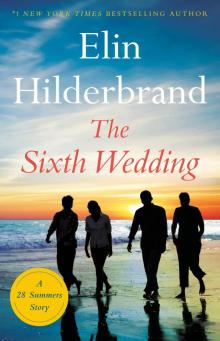- Home
- Elin Hilderbrand
Winter Solstice Page 6
Winter Solstice Read online
Page 6
Has Norah somehow found out about the party? Is this text just her angling for an invite? Jennifer knows that Norah harbors some regret about no longer being a part of the Quinn family. Jennifer doesn’t think she longs for Kevin, exactly; it’s more that she wants to be included in—or perhaps forgiven by—the larger family.
As Jennifer turns left onto Clarendon, she sees Leanne waiting for her outside the barre studio, and her anxiety diminishes just a little. Jennifer waves.
Be present, she tells herself. She will think about Grayson Coker and Norah Vale later.
AVA
She stands at the entrance of the Museum of Natural History at five minutes to eleven, waiting for Potter and PJ to emerge from the subway. Potter called the night before, saying that PJ had fallen asleep in the taxi. “I think his overreaction was due to exhaustion,” Potter said. “It’s harder to fly east than fly west.”
“Is it?” Ava said.
“Jet lag is a real thing!” Potter said defensively.
Potter’s plan today was to let PJ sleep in, then take him for a big breakfast at Tom’s Restaurant, and then they would fulfill PJ’s fervent wish to ride the subway. PJ’s enthusiasm to ride the subway has been fueled in part by Potter’s ex-wife, Trish, who said that under no circumstances was PJ to ride the subway.
Ava takes a deep breath of crisp October air. They will spend the afternoon at the museum, capping off their visit with the Hayden Planetarium, and then they will go for a late lunch. There’s a great banh mi shop down the street, or if PJ is amenable, they can sit outside at Cafe Luxembourg, where Ava and Potter can split a bottle of Sancerre and PJ can eat frites out of a paper cone.
And then tonight… what will they do tonight? An IMAX movie? A trip to the top of the Empire State Building? The ghost tour of Greenwich Village? The possibilities are endless.
Ava loves New York!
Ava’s reverie is disrupted by the sight of Potter’s head. They are so connected that Ava sometimes feels his presence before she actually sees him. A few seconds later PJ appears. Potter has PJ by one hand, but in PJ’s other hand is a device that has captured his attention. At least he’s not resisting, shrieking, or throwing a tantrum.
Ava waves to Potter, and he waves back and cuts a diagonal across the street, pulling PJ along.
“Hey there,” Potter says. His demeanor is unruffled. Ava decides to proceed as though last night never happened.
“Hey there yourself,” Ava says. She refrains from kissing Potter in front of PJ, although it’s difficult. Tread lightly, she thinks. They can act as though they’re friends who have randomly met up on the street. “Hey there, PJ. I’m Ava.”
PJ doesn’t respond. He doesn’t even look up. He’s absorbed in his game. He’s playing it on an iPhone 7, which is a nicer phone than either Ava or Potter has. Where did he get it? Does it belong to Trish? Certainly it’s not his—he’s only seven years old.
“Put the phone down, buddy, and say hello to Ava,” Potter says.
PJ doesn’t respond. His fingers are skating across the screen.
“What game are you playing?” Ava asks.
PJ doesn’t answer.
“Minecraft,” Potter says.
Ah, Minecraft. Ava has long listened to the people she knows with children complain about Minecraft. Apparently, it’s the bane of every parent’s existence. Even Ava’s sister-in-law Jennifer complains about it. But now Ava wishes she had been paying closer attention about what Minecraft is exactly. If she knew the details, she might be able to bond with PJ over the mines or the crafts.
“Shall we go in?” Ava asks. She leads the way through the entrance and waits while Potter gets tickets for the three of them, then they glide into the museum.
Ava hasn’t set foot in this museum since she was a child herself, but all the memories come rushing back. She recalls school field trips—brown bag lunches, the buddy system, worksheets to fill out in each wing—as well as the rainy weekends after Ava’s parents split. Ava and Patrick and Kevin used to spend the week with Margaret in the brownstone on East Eighty-Eighth Street, and the weekends with Kelley in his sleek, new high-rise down in the financial district. Kelley was a lost soul in those days. Ava wasn’t old enough to understand it then, though it’s clear to her now. Kelley’s brother, Avery, was dying of AIDS down in Greenwich Village, and so Kelley was adamant about spending his weekends with the kids uptown. Patrick and Kevin were teenagers, so they had friends and sports to use as excuses to escape the sad, desperate weekends with Kelley. But Ava was stuck. In clement weather she and Kelley went to Central Park, where they watched the roller skaters or threw stones in the Lake. When it was cold or raining, they came here.
There were things about this museum that Ava loved: the big elephant, the squid and the whale, the gemstones. She has bad memories of the dinosaurs and even worse memories of the Hall of Indigenous Peoples. She was sick to her stomach one Sunday and threw up in her father’s hands in front of the diorama of the Maoris.
“Where shall we start?” Ava asks. She has the map in her hand and is filled with optimism. The offerings in this day and age are almost overwhelming. There’s the Butterfly Conservatory, an exhibition on the Arctic, an exhibit on bats, an exhibit on the city of Petra, and one on the jewelry of Native Americans. There’s the planetarium, which they’ll save for last. There are the fossil halls, the dinosaurs, the mammals, the gems and minerals—they’ll have to stroll through there for old times’ sake—the Hall of Human Origins, and… the Discovery Room! Ava forgot about the Discovery Room, but she can vividly recall whiling away the hours there while Kelley read the Week in Review section of the Times on a bench. He didn’t realize that quality time meant he should get down on his hands and knees and marvel with Ava over the drawer filled with cowrie and turret shells.
But Kelley made up for it later. He was a wonderful father. He is still a wonderful father, Ava thinks. She fights to keep composed, but neither Potter nor PJ is paying attention to her anyway. PJ is staring at the phone, and Potter is looking around the museum, clearly at a loss.
“Dinosaurs,” Ava says. “Let’s start with dinosaurs.”
“Dinosaurs,” Potter says. He’s clearly relieved that Ava has taken charge. “You like dinosaurs, right, bud?”
PJ is too engrossed with his game to answer, and Ava looks up at Potter. Take it away from him! she thinks. We are in a museum! Surely, there are plenty of interactive screens here now, many more than twenty-five years ago. She can’t believe Potter is allowing him to willfully ignore his surroundings.
“PJ… ,” Potter says, but he stops. He looks helpless. What can Ava do but reflect back on Margaret’s words: You may think you know Potter inside and out, but just remember, you’ve never seen him be a parent. You may be surprised.
Potter is the most intelligent, evolved, kind, sexy, charming, and fun-loving man Ava has ever met. He’s everything she could dream of wanting. And yet as a parent… well, the most flattering word Ava can come up with right now is ineffectual. But she, for one, isn’t going to let PJ miss the wonders of this museum.
She crouches down. She realizes she hasn’t seen the color of PJ’s eyes. Are they blue like Potter’s?
“Hey,” she says. “PJ, we’re in a museum, and the museum has a lot of cool things in it, like dinosaurs and bats. Bats echolocate. Do you know what that means?”
PJ doesn’t flinch, or even blink. He is intent on his game, moving a finger with a sad, chewed-up nail over the screen. It’s like he’s hypnotized. Ava puts one hand on his arm, and with her other hand she reaches for the phone.
“Bad touch!” PJ screams. “Bad touch! Bad touch!”
Ava recoils. She stands up, her cheeks blazing. “I’m sorry,” she says.
Potter says, “Buddy, put down the phone. Here, I’ll take it.” He reaches out a hand, which PJ ignores.
Just take it from him! Ava thinks. But PJ is not her child. She needs to tread lightly.
Potter retracts his
hand and shrugs. He offers Ava a lame smile. “Shall we go see the dinosaurs?” he asks.
They wander through the museum, two adults feigning enthusiasm for arachnids and the rings of Jupiter, while PJ tags along, playing Minecraft. Ava hardly sees the point of all this. At the threshold to each new hall, she wants to tell Potter she’s going home. She will leave them alone for the rest of the weekend; she will join Drake and Margaret at Le Coucou tonight. But if she tells Potter this, he’ll be upset, maybe even angry. He’ll say she’s abandoning ship… then she’ll tell him he’s a piss-poor skipper… and then they will become one of those couples—a couple who bickers in public places.
So instead Ava plays along, and at one point, in the lush, steamy greenhouse that is the Butterfly Conservatory, Potter reaches for her hand and gives it a tight squeeze. And for just a moment everything is okay.
When they leave the museum, Ava is starving. She and Potter have been so busy trying to find an exhibit that would snatch PJ from the grasp of his device that they forgot all about lunch.
“Should we try for a table at Cafe Luxembourg?” Ava asks Potter once they are out in the mellow sunshine of the street.
He shakes his head. “Subway home,” he says.
“All right,” Ava says. “I’ll say good-bye now, then.”
“No!” Potter says, so loudly that PJ actually stutter-steps and looks up. “Please come back with us. I’ll order you the shrimp tebsi from Massawa.”
Ava does indeed love the shrimp tebsi from Massawa, but she also feels that what Potter and PJ need is time alone, time to bond, time to connect without interference from Ava. To tread lightly means to now make a graceful exit.
But when she looks up into Potter’s eyes, she sees fear. He’s afraid to be left alone with his own son.
“Okay,” she says. “Subway home, shrimp tebsi.”
Either the novelty of the subway wore off on the ride downtown or PJ was never really into it to begin with, because the wait, embarkation, ride, and disembarkation are all marked by the pinging and bleeping of PJ’s game. Ava begins to worry about the child’s eyesight and the unnatural bend to his young neck. She yearns to grab the phone and throw it at the third rail, where it will explode in a burst of blue electronic flame.
The doorman in Potter’s building, Keith, is a student at Columbia Journalism School. Ava has befriended him, and she enjoys talking with him about politics, but today his face is pained, stressed even, and Ava wonders if it’s midterm time already.
“Professor Lyons?” he says. “You have guests waiting outside your apartment.”
“Guests?” Potter says.
Keith shows Potter the IDs. “I told them you were out, but they said they wanted to wait. She said—”
“Yes, I know what she said.” Potter is suddenly abrupt.
“What is it?” Ava asks. She’s thinking it’s a disgruntled student, because Potter has this problem occasionally. He teaches plenty of kids who got used to coasting by with automatic As in high school only to arrive at the Ivy League and realize life isn’t always so easy.
Potter shakes his head and presses his lips closed as they enter the elevator.
When they step off on the seventh floor, Ava sees shadowy figures lurking outside Potter’s apartment door. Ava sees it’s a couple—a man with dark, curly hair wearing a gray flannel scarf wound artfully around his neck, and a woman wearing horn-rimmed glasses. The woman has a long braid trailing down one shoulder, and she’s wearing an adorable short white boiled-wool belted coat over a houndstooth skirt and boots. They look too old and too sophisticated to be students. Are they colleagues, maybe?
And then Ava gets it.
PJ drops his phone onto the carpeted hallway and sprints toward the couple.
It’s Potter’s ex-wife, Trish, and Trish’s boyfriend, Harrison. Ava remembers Harrison’s name because Harrison is British and Ava thinks of George Harrison, the Beatle.
Ava stands up a little straighter and runs a tongue across her teeth. She bemoans her own outfit: jeans and a J.Crew turtleneck in forest green, topped by her ancient brown corduroy jacket. The jacket is her security blanket, and she intentionally wore it hoping it would serve as a shield or armor against any insults or injuries inflicted by PJ. But now that she is faced with Trish in her supercute belted coat and fabulous suede stiletto boots, she wishes she’d worn something chicer.
When Ava said that she doesn’t feel (much) insecurity, she should have added an asterisk that said *except where Trish York is concerned. What does Ava know about Trish? That she’s a brilliant Shakespearean scholar, that she is a full professor at Stanford, that she comes from an aristocratic family (she grew up in one of the houses on Rainbow Row in Charleston, a city that Potter thinks is the most charming in the world). Trish grew up sailing and that is how she met Potter; they were both crew members on boats during Antigua Sailing Week.
Ava studies Trish now. She’s pretty in a sneaky way. The glasses are meant to obscure her clear eyes and impeccable skin. But Ava has learned by now—hasn’t she?—that beauty is as beauty does. She has wasted too much of her life fretting over supposedly beautiful women like Kirsten Cabot and Roxanne Oliveria, neither of whom proved to be a threat.
Potter says, “What are you doing here, Trish?”
Harrison steps forward, offering a hand. “Good to see you, Potter.” He has a very posh accent. “Potter” comes out as “Pawtah.” “We heard there was a bit of trouble, so we left that new fellow Simpson lecturing on Trump as King Lear and came straightaway.”
“Trouble?” Potter says.
Trump as King Lear? Ava thinks. She suspects most Shakespeare scholars have run out of things to talk about now, four hundred years later.
“PJ texted me about a ‘bad touch,’” Trish says. Her voice too holds a tinge of British accent, which comes across as an affectation to Ava. She expected a Southern belle. “You took him to the museum? Did someone fondle him?”
PJ buries his face in his mother’s coat. He’s clinging to her like a life buoy.
“The bad touch was me,” Ava blurts out. She cannot believe this is happening. She cannot believe that PJ, a seven-year-old without any discernible social skills, has manipulated four adults this way. She tries a smile. “I’m Ava, by the way. Ava Quinn.”
“That’s right,” Harrison says, returning her smile in spades. “You’re the daughter of Margaret Quinn. I think she’s brilliant, by the way. But I hear she’s retiring?”
“Next month,” Ava says. She is grateful to Harrison for the kindness, but she doesn’t want to veer off topic. “Anyway, I did touch PJ’s arm. I was trying to encourage him to lift his eyes from the game. He was really preoccupied.”
“That blasted game,” Harrison says.
“He only plays it when he feels uncomfortable,” Trish says.
“That’s bollocks and you know it, darling,” Harrison says. “He’ll play it nonstop if you let him.”
“Are you trying to say he feels uncomfortable around me?” Potter says.
“It’s not surprising,” Trish says. “He barely knows you.”
“Because you won’t let him see me,” Potter says.
“You’re welcome to come to California whenever you’d like,” Trish says.
“Right,” Potter says. “Because I’m free to just fly to California every weekend.”
“Not every weekend,” Trish says. “We agreed on one weekend a month. That lasted… what? One month? Two? But I understand you have plenty of time to jet off to Anguilla.” She cuts a glance at Ava. “And Nantucket.”
“Traveling down this road again, I see,” Harrison says. He holds his arms open to PJ, who jumps into them like a spider monkey. “I’ll take this chap down to the lobby so he doesn’t have to endure the parental quarrel.” He winks at Ava. “Care to join me, Miss Quinn?”
Ava doesn’t have much of a choice. Clearly Potter and Trish need to settle things privately. Ava follows Harrison and PJ into the elevator.
>
“Why is she coming?” PJ asks Harrison.
“‘She’ is Ava, PJ,” Harrison says. “I know you’re enough of a gentleman to address a lady properly, and when we reach the lobby, you’ll let Ava step off the elevator first. That’s what gentlemen do.”
“I don’t like her,” PJ says.
“What?” Harrison says. “You don’t like Ava? Well, I like Ava quite a lot myself. She’s a beautiful woman.”
“No, she isn’t,” PJ says.
“I’m standing right here,” Ava says with a smile. “I can hear you.”
“Maybe you’re not old enough to appreciate Ava’s beauty,” Harrison says. “And that is all well and good. You’re only seven years old, after all. Barely out of short pants.”
This gets a giggle from both Ava and PJ. The elevator doors open, and the gentlemen big and small wait for Ava to exit first.
“Why don’t you like Ava, PJ?” Harrison asks. “Did she lock you in a closet, feed you snakes, and then go and get her nails done?”
“No,” PJ says.
“Then tell me why you don’t like her.”
“Because,” PJ says.
“Because isn’t a reason,” Harrison says. “We’ve been over this a few thousand times, have we not?”
Reluctantly PJ nods. Ava is impressed with how deftly Harrison handles PJ. She likes to think she has solid skills in relating to children, but she was never this good.
“Don’t worry about it,” Harrison whispers to Ava. “He’ll come around.”
“Do you think?” Ava says. She wants to pepper Harrison with questions: How did Harrison first bond with PJ? What are a few of his favorite things, other than Minecraft? What is Ava’s best strategy for getting PJ’s guard down?
Harrison says, “I have an idea, actually. Why don’t you give me your cell number?”
“Okay?” Ava says, though she’s a bit taken aback. Why on earth would Harrison need her cell phone number? Still, she rattles it off and Harrison programs it into his phone.

 What Happens in Paradise
What Happens in Paradise Reunion Beach
Reunion Beach The Sixth Wedding
The Sixth Wedding 28 Summers
28 Summers Summer of '79: A Summer of '69 Story
Summer of '79: A Summer of '69 Story Troubles in Paradise
Troubles in Paradise The Perfect Couple
The Perfect Couple Winter Solstice
Winter Solstice Barefoot: A Novel
Barefoot: A Novel